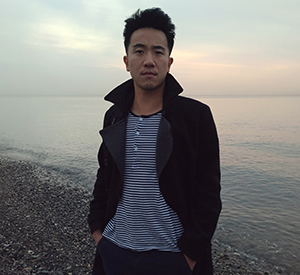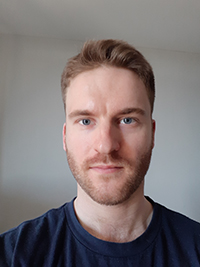Ritual Mournings: Samuel Strathman in Conversation with Jun-long Lee

Jun-long Lee, whose poem "Lightcarrion" appears in The Malahat Review's autumn 2019 Issue #208, discusses his creative routine, reading Russian poetry, and where his poem was written in his Q&A with Malahat Review volunteer Samuel Strathman. Read "Lightcarrion" here.
Jun-long Lee is the author of the chapbook Two/Ought and several short films; he also paints. His work has recently appeared in Conjunctions, Riddle Fence, and Contemporary Verse 2.
Where did the inspiration for "Lightcarrion" come from?
For the last three years, I have been moving back and forth between Canada, the Caucasus, Crimea, and Eastern Europe. I have noticed changes inside a body that is questionably mine: a layered density, its multiplication; a cyclical moulting; ritual mournings when something is misplaced or buried. “Lightcarrion” was written inside a house that is transparent, constructed from foliage and light. When you begin to resemble a plant, other bodies take on a different meaning. Yours, in the eyes of the transformed and transforming, takes on a different one too.
“Lightcarrion” has themes of nature and human nature. Do these themes appear in your other work as well?
Nature, yes; human nature, not often. I try my best not to point myself at the rest of my species: there are more practical ways to do that. Poems are useless, lovely leaves; they are perfectly suited for ritual, particularly sacrifice; inside them one might destroy the thing and return it to immanence, as Bataille might say, which moves in the opposite direction of the psychological, the political, even the confessional, which are all ultimately functional. I might talk about humans where they meet nature – where they turn or decompose into landscape.
What is your daily writing routine?
Sometimes I won’t write at all, or just notes. Other times I write in the morning, for a couple of hours. If I am lucky I will have a month or two where I write 4-6 hours a day, interrupted by walks or short trips; it’s during these months that any progress happens. I’ve organized my affairs so that I work very hard – I say work in the pedestrian sense – for six months, and this allows me to do and write as I please for the following year. Returning to the topic of walking: this is essential and wonderful for me, a lot of good things start on those walks. I carry around a camera, tripod, field recorder, and notebook. More often than not it’s the missed things that resurface, maybe from a walk that took place years ago – something that I had ‘til its reappearance forgotten – or a walk that has never taken place, or one that took place at night inside me...
Which poets have influenced your work the most?
Influences are always changing, often quickly; I’m embarrassed to commit to any; I reflect upon them like I might former partners, some with fondness, some with bewilderment, always not without shame, that’s a shortcoming. For the past decade or so, I can say that Paul Celan continues to make an impression on me, especially his later poems.
Lately I have been reading Russians (and some others) in Russian (this is hard). Regarding prose, I have strong feelings for Thomas Bernhard and Can Xue; they sing on opposite sides of the fate of literature: Bernhard as an apocalyptic lur, Can Xue as a harp for a hopeful future.
But let’s talk about poets I’ve been reading recently that I really liked: St. John Perse, Gennady Aygi – they are astonishing.
Do you have any projects on the go right now?
I am currently trying to find a home for my first collection of poems Abode, to which “Lightcarrion” belongs, and am a good ways into an early draft of a second collection.
What important messages do you want readers to take from your work?
I often find myself in the same places, at the same time of day which might not exist – incredibly bright, but softened by a smoke that slowly erases everything: ruined cathedrals, overgrown greenhouses, small deposits of rotting flowers, the person I stopped being when I was young, shallow reeds, shallow ponds, moisture-eaten books in damp apartments, the songs I sang with my mother and those I sang with my father, mutilated light in the forest in spring, countless corpses: bird, child, ancestor. I would like readers to see that exact moment when these things start to disappear, as if gnawed by weather or distance, when you doubt that your years are yours, when your nocturnal moments are indistinguishable from those that have expired, when you begin to smell the decay in your empty rooms...

Samuel Strathman
* * * * * * * *









